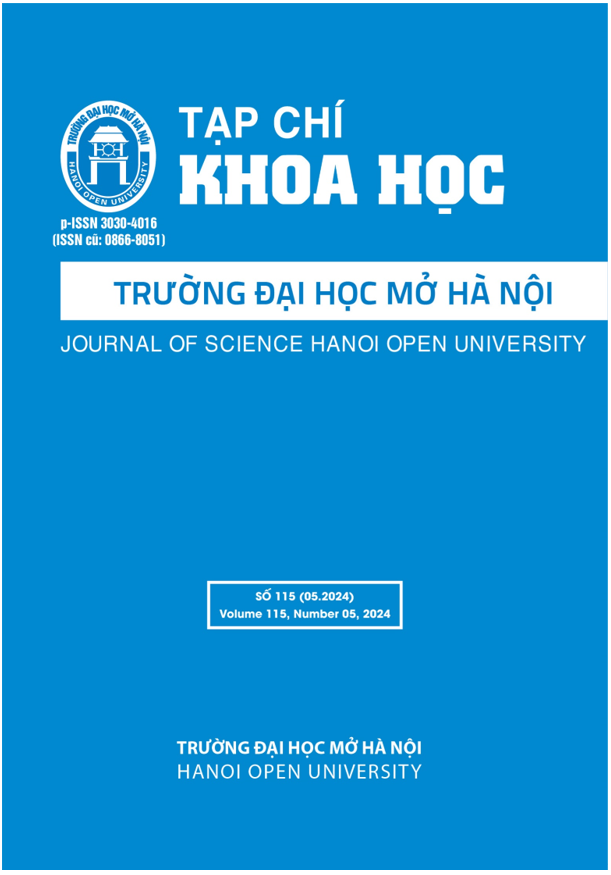CẢM NHẬN CỦA SINH VIÊN CHUYÊN NGÀNH TIẾNG ANH VỀ VIỆC PHẢN HỒI BÀI VIẾT TỪ GIẢNG VIÊN ĐỂ NÂNG CAO KỸ NĂNG VIẾT HỌC THUẬT
DOI:
https://doi.org/10.59266/houjs.2024.400Keywords:
viết học thuật, các yếu tố phản hồi hiệu quả, tầm quan trọng của phản hồiAbstract
Mục đích của nghiên cứu này là tìm hiểu việc sinh viên nhận thức ra sao về tầm quan trọng của việc giảng viên phản hồi bài viết và các yếu tố làm nên tính hiệu quả của các phản hồi trong quá trình học kỹ năng viết tiếng Anh học thuật tại Trường Đại học Công nghệ Đồng Nai. 70 sinh viên chuyên ngành Tiếng Anh đã hoàn thành bảng câu hỏi được giao. Trong đó có 12 sinh viên tình nguyện tham gia phỏng vấn bán cấu trúc. Kết quả cho thấy sinh viên đánh giá cao tầm quan trọng của việc nhận được phản hồi. Kết quả cũng chỉ ra rằng việc cung cấp cho sinh viên những phản hồi tích cực, toàn diện, rõ ràng và phù hợp cũng như những phản hồi thông báo cho sinh viên về những lỗ hổng kiến thức của họ trực tiếp cũng như gián tiếp là những đặc điểm được đánh giá cao nhất của một phản hồi hiệu quả. Nghiên cứu này góp phần nâng cao kiến thức về tính hiệu quả cũng như những yếu tố làm cho việc phản hồi người học trở nên hiệu quả và cung cấp một số gợi ý cho giáo viên dạy viết.
References
[1]. Agbayahoun, J. P. (2016). Teacher written feedback on student writing: Teachers’ and learners’ perspectives. Theory and Practice in Language Studies, 6(10), 1895-1904. Retrieved from http://www.academypublication. com/issues/tpls/vol06/tpls0610.pdf on October 20, 2019.
[2]. Arndt, R. (2019). A qualitative study of corrective feedback. Retrieved from https://repository. stcloudstate.edu/cgi/viewcontent. cgi?article=1028&context=tesl_etds on July 29, 2020.
[3]. Boud, D., & Molloy, E. (2013). Rethinking models of feedback for learning: the challenge of design. Assessment & Evaluation in Higher Education, 38(6), 698-712. https://doi. org/10.1080/02602938.2012.691462
[4]. Cahyani, N., & Murtafi’ah, B. (2022). Undergraduate students’ perceptions of teachers’ written feedback in academic writing class: A survey study. Communications in Humanities and Social Sciences, 2(2), 60-64.
[5]. Duong, M.T. A Portfolio-Based Learner Autonomy Development Model in an EFL Writing Course. Ph.D. Thesis, Suranaree University of Technology, Nakhon Ratchasima, Thailand, 2015.
[6]. Li, H. H., Zhang, L. J., and Parr, J. M. (2020). Small-group student talk before individual writing in tertiary English writing classrooms in China: Nature and insights. Front. Psychol. 11, 1-16. Doi: 10.3389/fpsyg.2020.570565
[7]. Listyani. (2021). EFL writing students’ responses towards teacher feedback to enhance their writing quality. Theory and Practice in Language Studies, 11(1), 20-28. Retrieved February 28, 2022, from http://dx.doi.org/10.17507/ tpls.1101.03
[8]. Nguyen, T.P.T. Teachers’ Beliefs in the Necessity and Feasibility of Fostering Learner Autonomy in Learning Writing. Master’sThesis, Ho Chi Minh City Open University, Ho Chi Minh Teacher Feedback in Second Language Writing Classes. English Language City, Vietnam, 2019. Teaching, 7, 73-83. http://dx.doi.
[9]. Ouahidi, M., & Lamkhanter, F. org/10.5539/elt.v7n2p73 (2020). Students’ Perceptions About [13]. Zaman, M.M.; Azad, M.A.K. 2012. Teachers’Written Feedback on Writing Feedback in EFL writing at tertiary in a Moroccan University Context. 10.1007/978-3-030-25830-6_2. level: Teachers’ and learners’ perceptions. ASA Univ. Rev. 2021, 6,
[10]. Raihany, A. (2014). The Importance 139-156. of Teacher’s Written Feedback on the [14]. Zhang, T. T., and Zhang, L. J. (2021). Students’ Writing in Teaching Learning Process. Okara: Jurnal Bahasa dan Sastra, 8, 91-106.
[11]. Saragih, N. A., Madya, S., Siregar,R. A., & Saragih, W. (2021). Written Corrective Feedback: Students’ Perception and Preferences. International Online Journal of Education and Teaching, 8(2), 676- 690.
[12]. Seker, M. and Dincer, A. (2014) An Insight to Students’ Perceptions on Taking stock of a genre-based pedagogy: Sustaining the development of EFL students’ knowledge of the elements in argumentation and writing improvement. Sustainability. 13, 1-25. doi: 10.3390/su132111616
[15]. Zahida, R., Farrah, M., & Zaru, N. (2014). The impact of three types of written feedback on the motivation and writing skill of English major students at Hebron University. An - Najah Univ. J. Res. (Humanities), 28(5), 1275-1297.
